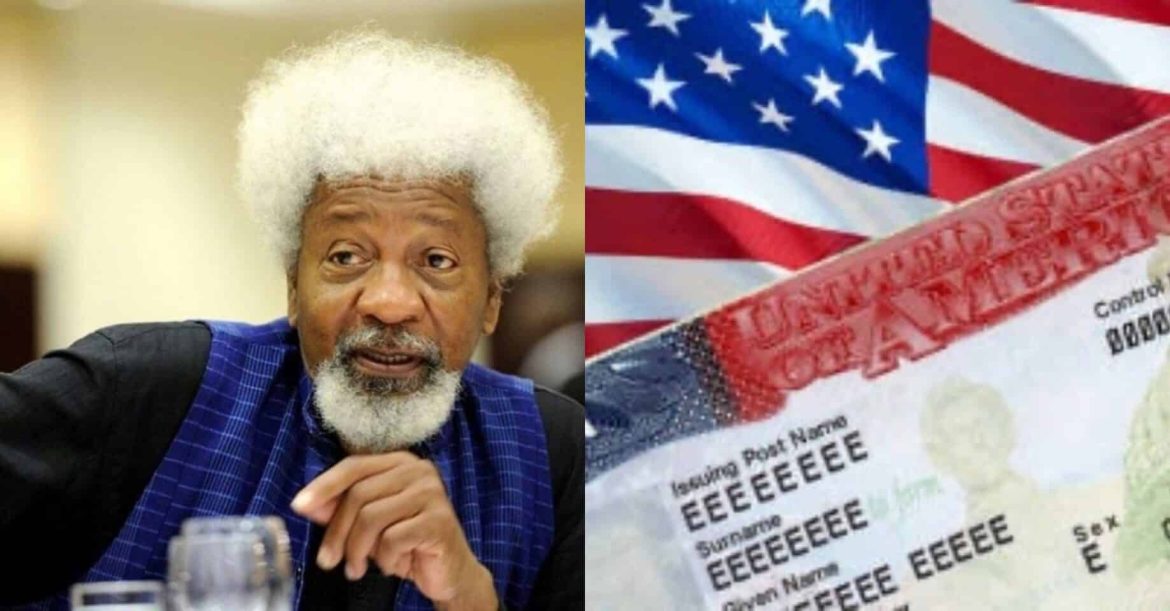694
By Myke Agunwa
Nobel laureate, Professor Wole Soyinka, has revealed that his visa to the United States has been revoked, effectively barring him from entering the country.
The literary icon made the disclosure on Tuesday during a press briefing at Kongi’s Harvest Gallery, Freedom Park, Lagos Island, saying he decided to address the media to prevent confusion among his international hosts.
“It is necessary for me to hold this conference so that people in the United States, who are expecting me for this event or that event, do not waste their time. I have no visa; I am banned, obviously, from the United States. And if you want to see me, you know where to find me,” he said.
The erudite professor said he was officially informed of the visa revocation through a letter from the U.S. Consulate in Lagos, dated October 23, 2025.
The letter, which he read to journalists, stated in part:
“This letter serves as official notification by the United States Consulate General in Lagos that the nonimmigrant visa listed below has been revoked pursuant to the authority contained in U.S. Department of State regulations.”
The 1986 Nobel Prize winner in Literature expressed surprise over the decision, noting that he had never been involved in any criminal activity or legal infraction that could warrant such an action.
“I’m still looking into my past history… I don’t have any criminal record or even a misdemeanour to qualify for the revocation,” he said. “I keep asking myself — have I ever misbehaved toward the United States of America? Have I gone against the law anywhere?”
He did not disclose whether he had appealed the decision or sought clarification from U.S. authorities but hinted that he would remain focused on his ongoing projects in Nigeria and across Africa.
“I have been invited to a number of events in the U.S. over the coming months,” Soyinka said, “but it’s clear now that I cannot attend them unless this issue is resolved. For now, those who want to see me know where to find me.”
The U.S. Embassy in Nigeria and the Department of State in Washington had not issued any public statement as of press time.
However, some observers have linked it to his history of outspoken criticism of U.S. domestic and foreign policies.
In 2016, following the election of Donald Trump, Soyinka publicly announced that he had torn up his U.S. Green Card, a symbolic act of protest against what he described as the “rise of xenophobia and the politics of exclusion” in America.
“I have no need for it anymore,” he said at the time, lamenting what he saw as the moral decline of a country that once championed freedom and human rights. The decision drew wide international attention and mixed reactions, with some American commentators defending his stance and others calling it “grandstanding.”
Soyinka has also been a persistent critic of U.S. foreign policy in Africa and the Middle East, accusing Washington of hypocrisy in promoting democracy abroad while often supporting regimes with poor human rights records.
In a 2018 lecture in Johannesburg, he argued that the United States had “lost its moral compass” and “betrayed the ideals on which its democracy was built.” He also condemned the U.S. travel ban targeting Muslim-majority countries, calling it “a stain on the conscience of a once-enlightened republic.”
During the global protests over the murder of George Floyd in 2020, Soyinka again voiced strong criticism of systemic racism in America, warning that “when a society refuses to confront its demons, those demons take over the soul of the nation.”
While there is no evidence linking these past remarks to the current visa decision, some analysts believe his long record of outspokenness may have contributed to a “heightened level of scrutiny” from U.S. authorities.
Others, however, argue that the revocation may simply be administrative or procedural, a routine action that sometimes affects frequent travelers.



